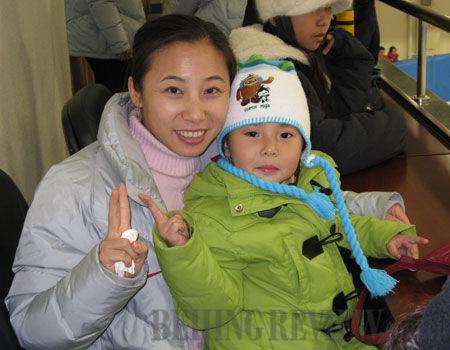|
 |
|
SWEET MOMENT: Li Yan and her daughter (BAIDU.COM) |
In fact, it was a difficult choice for Li, mother of a baby girl who was less than two years old at the time.
"My new job in China meant that I could only see my family during vacations," Li recalled. "But I was trained by my home country, and I was sure that my daughter would be proud of what I was doing—coaching the Chinese team to win gold medals at the 2010 Winter Olympics in Vancouver."
Once a 'stepmother'
At the time Li returned, three of the four gold medals that China had won since it debuted in the Winter Olympics in 1980 were from women's short-track speed skating.
As an old Chinese saying goes, even the strongest tiger cannot fight a pack of wolves. In Li's eyes, Turin Olympic gold medalist Wang Meng was the "tiger" and the South Korean team was the "pack of wolves," having won six of the eight gold medals in short-track speed skating at the Turin Olympics.
"I knew exactly what the team's disadvantage was—the absence of satisfying results—and what I could offer for improvement," Li recalled. "I wanted to start my work as soon as possible."
Li chose a batch of talented skaters for the national team in July 2006 and coached them to win four gold medals at the Asian Winter Games, the first test for her in 2007.
Unfortunately, the fight between the team's backbone Wang Meng and Li became a hot topic in the media as Wang threatened to quit after finishing the Asian Winter Games due to Li's alleged "bias."
"I felt unhappy when I saw that Li cared about the rookies in training more than me. I thought I was the best skater who deserved the best training," Wang recalled, smiling. "Both of us were tough women, and I was big-headed at the time."
"Wang is a talented skater, but it is definitely better for her to have teammates who support and cooperate with her during competitions rather than to compete alone," Li said. "The challenge for me is how to make talented skaters like Wang better and stronger."
Li said she had yet to know herself enough at the time and that it took time to adjust to the new environment. She made up her mind to change herself and forgive others during her vacation to the United States in 2007.
"I was capable of helping the team. I'm a Chinese, and as a former Olympian, I couldn't leave the sport," Li explained.
Li appointed Wang team captain after Wang's return to the team. They finally reconciled as both Li and Wang had the same Olympic dream.
Living in a single room at the team's training base in downtown Beijing, Li spent most of her spare time watching match videos and writing training reviews. She said she did not mind being called "stepmother" as long as her ambitious training plans—both for skaters and fellow coaches—worked well.
"Li has brought some fresh ideas to the team," said Wang Chunlu, vice head of the Chinese national short-track speed skating team and a former Olympic short-track speed skating medalist.
"She managed to make innovations in technique and training—there has been an obvious improvement in the athletes' slide angles and routines. Besides, the equipment such as blades has also improved," Wang said.
"Li is serious and quite demanding in training," echoed Yang Zhanyu, Li's fellow coach who is in charge of equipment management. "I used to sharpen six pairs of blades in one day, which took me three hours per pair. She might get angry during the training, but we all know that she pursues perfection."
More than gold medals
The Vancouver Winter Olympics, held from February 13 to 28, witnessed the Chinese team's best-ever medal count—five gold, two silver and four bronze, compared with two gold, two silver and four bronze in 2002, and two gold, four silver and five bronze in 2006.
Li enjoyed her best-ever coaching results, too. The team, whose average age is under 22, swept all four gold medals in the women's short-track speed skating events. This makes Li the most medaled coach at one Winter Olympic Games in Chinese history.
Wang Meng's kowtow to Li on the ice soon after defending her title in the women's 500-meter on February 17 remains fresh in the minds of many. In Chinese culture, kowtowing to eldership or teacher is the traditional and most respectful way of expressing gratitude, especially during the Chinese lunar New Year, which started on February 14.
"The Chinese short-track speed skating team is united and progressive," Li said. "They are perfect, and I'm really proud of every one of them. All of my work has paid off."
Li considers the Winter Olympics a platform for promoting short-track speed skating in China, as millions of spectators were able to watch it on television at home.
"I hope that more and more young people will participate in the sport," she said.
"I can hardly imagine my future career without Li as my coach," Wang Meng said in an interview with CCTV (China Central Television) after winning her third gold medal. "I hope she can have a family reunion in Beijing."
But Li hasn't yet considered what the future holds for her.
"I haven't thought about the future contract yet," she said. "All I'd like to do is take a rest and spend some time with my daughter in Beijing."
(Source: CCTV, Beijing Youth Daily and Beijing Evening News) | 